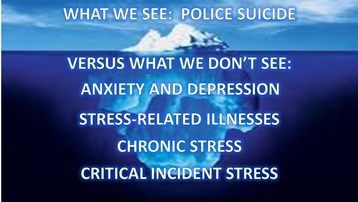By Uniform Stories
I woke up this morning and checked my phone like I always do, looking to see if anything important had happened while I slept.
As I checked the messages on the social media pages I monitor related to law enforcement support I was confronted with the most disturbing of messages, and one that I see all too often — another police officer had chosen to end his life by suicide. The message reads, in part:
Please keep my hometown and [redacted] police department in your prayers. We just lost a 15 year Sergeant with a wife and three kids at home to suicide. [The department] hasn’t made a public post as to how they died so it’s why I’m messaging you. I’m just kinda shocked because my hometown police never really experiences things like this. I just wish I could’ve helped in some way. Too close to home.
Yes, it’s way too close to home when an officer suicide happens, especially among those that are part of his or her law enforcement family.
By the “official” numbers, there are nearly as many deaths by suicide among active officers each year as there are line-of-duty deaths. It’s hard to know whether those numbers are accurate, though, because the news media are often limited as to what they can report, and the departments are reluctant to talk about a suicide happening among their ranks because it may hurt the reputation of the department. I am aware of police agencies that will not allow an officer who has died by suicide to be buried in his or her uniform because of the stigma of associating that manner of death with the police agency.
We see the death by suicide, but we don’t always see the underlying factors that lead to it.
I’ve come to call incidents of officer suicide “the other line of duty death”. It’s the one that is not discussed — but all too often the effects of the job are what may lead an officer to believe that suicide is the only logical way to escape the pain.

(Photo/Humanizingthebadge.com)
Police officers are impacted by:
- Critical incident stress — Reactions to traumatic incidents they are involved in that have a tendency to overwhelm their normal coping mechanisms. Unchecked, the lack of ability to cope well manifests itself in the symptoms of post-traumatic stress.
- Chronic stress — The cumulative effects of both critical incident stress as well as just the so-called “normal” stressors associated with police work. Officers tend to develop unhealthy coping mechanisms over the years that often lead to further trauma.
- Stress-related illnesses — Heart disease, high blood pressure, intestinal disorders, substance abuse, insomnia, and many other illnesses that are directly attributable to unresolved issues related to stress and the unhealthy ways in which the individual has tried to cope.
- Anxiety and depression — There is a huge stigma associated with police officers seeking mental health assistance. Fearing they will be declared unfit for duty, their symptoms grow worse until they believe there is no hope remaining. According to the International Critical Incident Stress Foundation, approximately 90 percent of individuals who die by suicide have untreated mental illness, and individuals with serious mental illness die by suicide at rates 6 to 12 times higher than the general population.
If you are an officer who needs help to cope with issues in your life and career, or if you are a family member or friend of an officer who wants to know what you can do to help, I want you to know that free, confidential stress coaching is available to you if you will send a private message to any of the following:
PLEASE NOTE: If you are in crisis now, and need someone to talk to immediately, please call the National Suicide Prevention Lifeline at 800-273-TALK (8255). They provide confidential assistance and are available 24 hours a day, 7 days a week, year-round.


